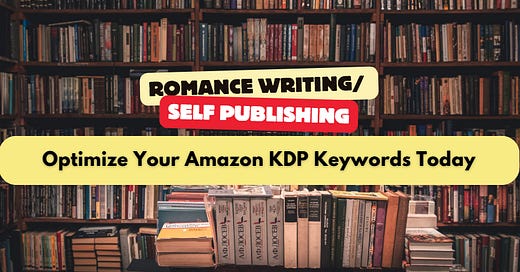How to Stand Out on Amazon: Optimize Your KDP Keywords Today
Amazon Kindle Direct Publishing (KDP) is a gateway for authors to reach millions of readers. However, optimising keywords for searchability is essential to stand out in the vast ocean of available titles. Ensuring your book gets discovered requires one key ingredient: effective keyword optimization. Keywords help your book appear in relevant search results, and optimizing them properly can greatly boost your visibility and sales.
What are KDP Keywords
When uploading your book on KDP, Amazon allows you to input up to seven keyword slots. These keywords or phrases act as search terms that readers use to find books similar to yours.
Short-Form Keywords: Single words or short phrases (e.g., romance, spy thriller). These are broad and may attract a wide audience but also face intense competition.
Long-Form Keywords: Longer, more specific phrases (e.g., small-town second-chance romance, action-packed spy thriller with twists, fast-paced spy thriller with strong female lead). These target niche readers and reduce competition, increasing the likelihood of appearing in relevant searches.
Why Optimized Keywords Matter
Optimized keywords:
Boost your book’s discoverability.
Increase visibility in Amazon’s search results.
Help attract the right audience to your book.
Remember, the goal isn’t just traffic but relevant traffic that converts into readers and buyers.
My Personal Keyword Trick
Although there are some paid tools like Publisher Rocket to find the relevant keywords that actually work and get your book more visibility, I use the best FREE one possible. When uploading my books, I use Amazon’s Search Bar Suggestion Tool as a quick and efficient way to find trending and relevant keywords. Here's how you can do it:
Go to Amazon’s search bar.
Begin typing the trope or genre relevant to your book. For example, if your book’s trope is enemies to lovers, start typing "enemies to lovers."
Amazon will auto-suggest keywords based on what customers are actively searching. Examples might include:
enemies to lovers dark romance
enemies to lovers slow burn
steamy enemies to lovers romance novel
Select the suggestion that best matches your book's theme, tone, and audience, and use it as one of your long-form keywords.
This ensures that you’re aligning your book with phrases readers are already searching for, improving your chances of discovery.
Other Strategic Placement of Keywords
While KDP provides specific keyword slots, strategic placement of keywords in other parts of your book’s metadata and description is just as important:
Title / Subtitle:
Example for romance: "Love Beyond the Storm: A Second-Chance Romance"
Example for thriller: "Chasing Shadows: A High-Stakes Spy Thriller"
Example for romantic suspense: "Whispers of Deceit: A Riveting Romantic Suspense Novel"
Including primary keywords in your title/subtitle immediately informs readers about your genre and subgenre.
Blurb (Book Description):
Incorporate your keywords naturally in the blurb. Avoid keyword stuffing, but ensure key terms align with your audience's searches.Romance Example: "Escape into this heartwarming story of a small-town baker and a brooding mechanic finding love amid life’s chaos."
Thriller Example: "Follow Agent X in this gripping, action-packed spy thriller full of danger, betrayal, and high-stakes missions."
Keyword Slots in KDP:
Each slot can include phrases of up to 50 characters. Use combinations of short and long-tail keywords to maximize discoverability.Romance: small-town billionaire romance, enemies to lovers romance novel, heartfelt contemporary romance, forbidden billionaire romance, historical romance with strong heroine, second-chance holiday love story.
Thriller: fast-paced political thriller, spy novels with female protagonists, edge-of-your-seat suspense books, gritty detective mystery, psychological suspense with twists, action-packed espionage thriller.
Marketing Materials:
Use the same keywords in your Instagram posts, email newsletters, and Amazon A+ content to reinforce searchability.
Pro Tip: Test and Update Regularly
Amazon's algorithm evolves, and so should your keywords. Monitor your book’s performance and update your keywords periodically based on sales trends and new reader behaviors.
Other Tips for Keyword Selection
Think Like a Reader:
What would your target reader type into Amazon’s search bar? Use their perspective to create your keyword list.Niche Down:
Broad terms like “romance” or “thriller” are highly competitive. Target specific subgenres or tropes to appeal to niche readers.Example: Instead of “romance,” try “best friend’s brother contemporary romance”.
Instead of “thriller,” try “crime thriller series with strong female lead”.
Focus on Tropes and Themes:
For Romance: second chance romance, billionaire romance with steamy scenes.
For Thriller: mystery thriller with a shocking twist, serial killer suspense novel.
Seasonal and Trend-Based Keywords:
Tie your book to current trends or seasons.Romance: holiday romance novella, Christmas love stories.
Thriller: summer beach thrillers, gripping fall reads.
How to Stay Compliant and not go against Amazon KDP terms in Keyword Selection
When it comes to Amazon KDP keyword usage, there are specific restrictions in place to maintain compliance with Amazon’s guidelines. Keywords are a powerful tool to make your book discoverable, but using restricted or inappropriate terms can lead to your book being flagged or even removed from the platform. Here are some words and practices not allowed in KDP keywords:
Prohibited Words and Practices for KDP Keywords:
Other Authors’ Names
Using famous author names (e.g., "Colleen Hoover," "Stephen King") in your keywords to attract searches is against Amazon’s terms.Other Book Titles
Do not include the titles of other popular books (e.g., "It Ends With Us" or "The Shining") as keywords.Misleading Information
Keywords that misrepresent the content of your book, such as claiming it's a "cookbook" when it isn’t, are prohibited.Temporary or Promotional Phrases
Words such as "free," "bestseller," "discounted," "on sale," or any phrase indicating a temporary condition of the book are not allowed.Offensive or Inappropriate Terms
Any keyword that is deemed inappropriate, offensive, or explicit violates Amazon's guidelines.Claims or Guarantees
Keywords like "guaranteed results," "lose weight fast," or other claims aren’t allowed unless supported explicitly by the content of the book.Non-related Terms
Including keywords unrelated to your book's content (e.g., a romance book with "horror" keywords) is misleading and violates Amazon’s policies.Repetitive Keywords
Amazon discourages the use of repeated keywords or phrases across multiple fields. For instance, if "romance novel" is a keyword, avoid reusing it in every other slot.
Hence before uploading your book on Amazon KDP, always double-check your keywords for compliance with Amazon's KDP Content Guidelines.
Elevate Your Marketing with My Instagram Toolkit!
Did you know I have an Instagram Toolkit for Authors that can take your book promotion game to the next level? It’s packed with proven strategies, tips, and Canva templates designed to help you grow your audience and boost book sales.
📣 Special Offer: Get it now for INR 999 (valid today only). Starting tomorrow, the price increases back to INR 1499, so don’t miss out!
DM me to know more on my Instagram ID @ madhuritamse or click HERE to grab your copy and watch your author business soar.







This was very helpful. I plan on going through Draft2Digital to publish my books and I know they post on Amazon for you, and I think they ask for this info upfront when you're putting in your book info. I did what you did and looked at books like mine and used those keywords.